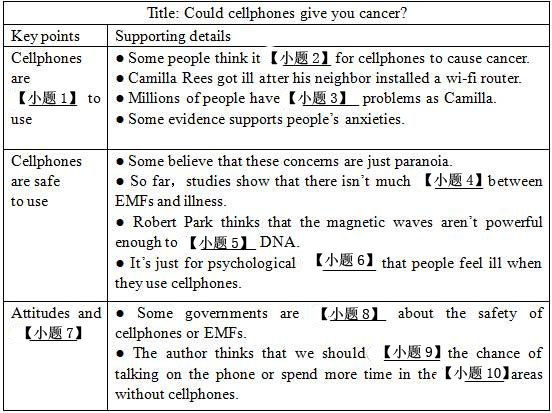题目内容
Could your cellphone give you cancer? Whether it could or not,some people are worrying about the possibility that phones,powerlines and wi-fi could be responsible for a range of illnesses,from rashes to brain tumors.
For example,Camilla Rees,48,a former investment banker in the US,moved out of her apartment in San Francisco because of the radiation coming from next door.Rees told the Los Angeles Times that when her neighbors moved in and installed a wi-fi router she lost her ability to think clearly.“I would wake up dizzy in the morning.I’d fall to the floor.I had to leave to escape that nightmare,” she saiD. Since then,she’s been on a campaign against low-level electromagnetic fields,or EMFs(低频电磁场).
And she’s not alone.Millions of people say they suffer from headaches,depression,nausea and rashes when they’re too close to cellphones or other sources of EMFs.
Although the World Health Organization has officially declared that EMFs seem to pose little threat,governments are still concerneD. In fact,last April,the European Parliament called for countries to take steps to reduce exposure to EMFs.The city of San Francisco and the state of Maine are currently considering requiring cancer-warning labels on cellphones.
If these fears are reasonable,then perhaps we should all be worried about the amount of time we spend talking on our phones or plugging into wi-fi hotpots.
Some say there is evidence to support the growing anxieties.David Carpenter,a professor of environmental health sciences at the University at Albany,in New York,thinks there’s a greater than 95% chance that power lines can cause childhood leukemiA. Also there’s a greater than 90% chance that cellphones can cause brain tumors.
But others believe these concerns are unreasonable paranoia (猜疑).Dr.Martha Linet,the head of radiation epidemiology at the US National Cancer Institute,has looked at the same research as Carpenter but has reached a different conclusion.“I don’t support warning labels for cellphones,” said Linet.“We don’t have the evidence that there’s much danger.”
Studies so far suggest a weak connection between EMFs and illness — so weak that it might not exist at all.A multinational investigation of cellphones and brain cancer,in 13 countries outside the US,has been underway for several years.It’s funded in part by the European Union,in part by a cellphone industry group.
According to Robert Park,a professor of physics at the University of Maryland in the US,the magnetic waves aren’t nearly powerful enough to break apart DNA,which is now known threats,such as UV rays and X-rays,cause cancer.
Perhaps it’s just psychological.Some experts find that the electro-sensitivity syndrome seems to be similar to chemical sensitivity syndrome,which is a condition that’s considered to be psychological.
Whether EMFs are harmful or not,a break in the countryside,without the cellphone,would probably be good for all of us.

 口算题卡北京妇女儿童出版社系列答案
口算题卡北京妇女儿童出版社系列答案
